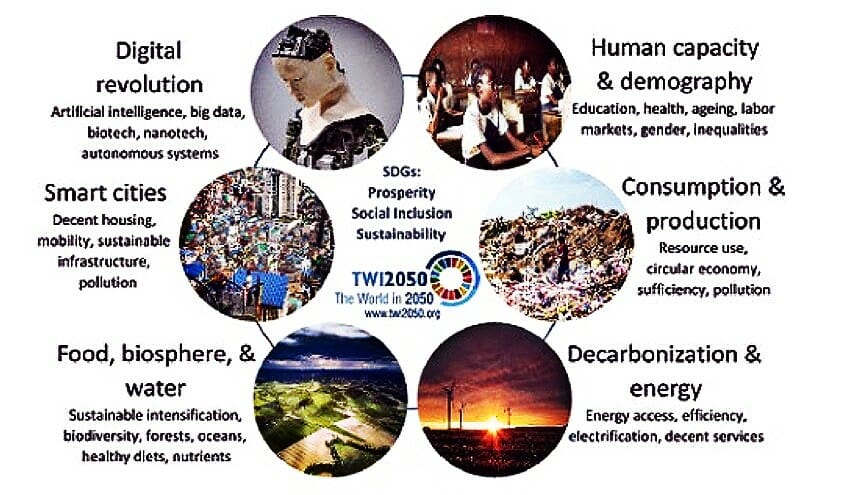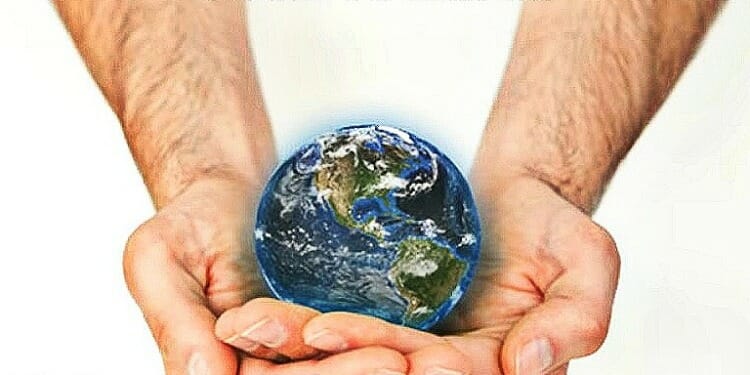Global One Health and Welfare is the only way to save our future: Public and non-public voices must speak out and make the interface between the environment, human, animal, and plant health a priority. If not, what happened at COP26, the world conference held last November in Glasgow, Scotland, to address climate change, will happen again and again. Called to address an existential issue for both the planet and humanity, the conference failed miserably. As Greta Thunberg famously said: ‘The #COP26 is over. Here’s a brief summary: Blah, blah, blah’”.
Substantial political decisions on a global scale are delayed as soon as (supposedly vital) interests are hit.
We have to realize that there is not much time left; the last decades of this century may be too late. As outlined by The World In 2050 (TWI 2050), the first report prepared by the World in 2050 initiative established by the International Institute for Applied Systems Analysis (IASA) to provide scientific foundations for the United Nations 2030 Agenda. The report identified six exemplary transformations which will allow achieving the SDGs and long-term sustainability to 2050 and beyond:
 The conclusion is sobering: According to the 60 authors who worked on the report, neither the 2030 or 2050 targets will be achieved, a finding that essentially underscores the need to take action now.
The conclusion is sobering: According to the 60 authors who worked on the report, neither the 2030 or 2050 targets will be achieved, a finding that essentially underscores the need to take action now.
Protests on social media or campaigns from bottom-up action groups typically disappear as fast as they pop up and are not the solution. What is needed is both bottom-up and top-down action, calling on the all-vital forces of society – in an equitable, inclusive manner – to come together to draw the path forward.
More specifically, what is needed is expertise from the natural and social sciences from all parts of the world. There are multiple examples of One Health national or international public organizations. Of equal if not of greater effect are the non-governmental entities and networks such as the One Health Commission (OHC) and One Health Initiative (OHI) both of which principally bring together medical professionals in two historically separate branches of knowledge: doctors and veterinarians, and member organizations such as the International Student One Health Alliance.
These non-governmental organizations are largely over-represented by North America and Europe. They do not mirror or engage the wealth and breadth of experts in a worldwide “Who’s Who,” nor are they sufficiently placed in their leadership and oversight.
Furthermore, there are no systemic links between the bottom-up approach of working groups and a top-down follow-up and guidance by leadership. In a 2019 article entitled One Health, One Welfare, One Planet the authors focus on the critical need to push for a global framework for One Health action. This would require, at a minimum, structured exchanges of opinion, consensus, and obligatory agreements. To proceed effectively and go beyond information exchange requires detailed consideration of the following:
I. Internal conditioning:
1) The future of our planet is undoubtedly at risk, but the Global North cannot alone redirect the trajectories: Working for effective international cooperation is necessary. The global inclusive orientation must be reflected in leadership composition.
2) The ecological imbalances of our planet can be diagnosed by veterinarians and physicians but not solved alone. To correct and redress the threatening trajectories followed today it requires the full involvement of the social sciences: sociology, economy, laws, and policy.
3) The systemic links between the bottom-up approach of working groups and a top-down leadership must be systematized. These organizations need to formulate mid- and long-term strategic perspectives and detailed action programs, with related target-setting including. deadlines, success criteria, and monitoring mechanisms.
4) A globally acting organization requires comprehensive by-laws, including a broad definition of membership, an elected executive board, executive director, an annual budget and which is transparent and shared, regular reports on progress.
II. External Outreach:
As stated, globalization on the one hand can lessen our inclinations and ties which link us principally to where we live or our ethnic group, but on the other hand, is the pathway to heighten recognition of the benefits from complementary and compensatory attitudes and behaviors.
The Covid-19 global pandemic is the most recent example of myopic behavior in instances that result in severe and sometimes violent public protests against restrictions by governments. As I write, the protests that started two weeks ago in Canada with the “Freedom Convoy” have now extended to Europe and Australia.
And should there be new potent variants, a further deteriorating situation will initiate other necessary restrictions, leading in the end to significant changes—permanently- a new “normal,” lifestyle. To get ahead of such a scenario, to save us and our planet, will require political, economic, sociological, environmental analysis and intervention.
How Can One Health and Welfare Become a Global Priority?
Today societies have either experienced or have the potential for harmful and aggressive behavior, or in some cases only waiting in the shadows to be unleashed in both word and deed. This may be more likely contained in some societies such as those in Scandinavia, but even there they are likely unlocked by steepening social, economic and political divides.
This societal polarization is exacerbated by the COVID-19 pandemic, how it originated, and how it continues and evolves, which is essentially what the One Health approach is about – namely the interface between humans, animals, plants, and the environment.
Everywhere easy access and largely uncontrolled social media make it easier for some to form extremist positions and create cocoons of radical opposition. These grow especially rapidly in times of general hardship when people are looking desperately for any exit from their current state of affairs. To get on top of, ahead of, and looking toward a better future, we need on the global stage far more “Active Civility” to change radical behavior. A recent Impakter article sharpens the argument stating that there are two separate worlds today, the well-situated “Connected” and the deprived ”Disconnected”, e.g. in large parts of Subsaharan Africa. To progress toward One Health, it will not be enough to organize the “Connected” but we must proactively engage impoverished and marginalized “Disconnected” populations.
We are in unpredictable and dangerous times, in many respects much as Noah faced with the deluge; Will it be repeated? Or can people everywhere accept and implement an approach to do common good and treat humans, animal, plants, and the environment as our “One Health” opportunity?
Our Senior Columnist Richard Seifman contributed.
Editor’s Note: The opinions expressed here by Impakter.com columnists are their own, not those of Impakter.com. — In the Featured Photo: One Health in action – screenshot from CDC video










